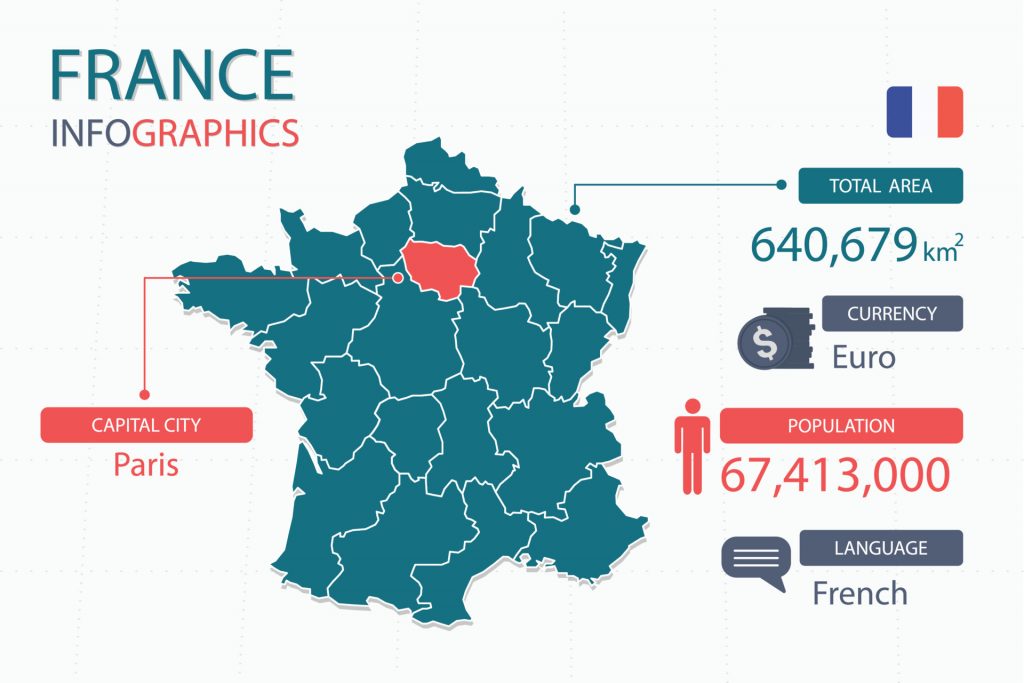The origins of the French Language
French is a major language of the world. It is the official language in 29 countries in the world. These countries include ones in Western Europe (France, Luxembourg, and Switzerland, among others), Africa (Niger, Burkina Faso, Senegal, etc.), the Middle East (Lebanon), and Oceania (Vanuata). Approximately 274 million people who are speakers of French. These include native speakers and L2 speakers. In terms of native speakers, there may be around 150 million speakers, but this depends on definitions of what constitutes a native speaker, especially with a language such as French, where it may be an official language in certain countries, but the populations of these countries may speak local dialects in one sphere of life, but use French in other ones.
In terms of linguistic features, French is very similar to other European languages, especially Romance languages, as it belongs to this group. The word order is subject-verb-object, like other Romance languages such as Spanish, Italian, etc., but also like many languages outside of this family, such as English. Like other Romance languages, it has an extensive tense-aspect system, where verbs are conjugated based on the time meaning that is implied. It also stem from Vulgar Latin, but there has been a significant influence from Frankish, a language spoken by Germanic tribes that invaded certain areas of present-day France.
One characteristic that defines French is its long history acting as an international language. Notably, it is the primary or secondary language of a large number of major global organizations including, the European Union, the International Olympic Organization, the North Atlantic Treaty Organization, the United Nations, and the World Trade Organization, among others. Historically, it has been an international language of business and trade, academia (e.g., the sciences), international politics, and literature, as well as being a symbol of high-culture. This is due to many factors such as intellectual movements, colonization, fashion, art, and so on.

The French writing system uses the Latin script, similar to English and a plethora of other Western European languages. This script contains the standard 26 letters (A-Z). Like these other languages, it is written from left to right, with the lines being read from the top-to-bottom of the page. What may be unique in French is the way different accent marks are used to represent different vowel sounds. There are also ligatures, when two letters are combined and written as a single letter, such as the combination of o and e to form œ such as in the word œuf (egg). Another notable characteristic of the French writing system is its adherence to more archaic rules of spelling that may have reflected pronunciation in older times, but does not necessary reflect the modern French pronunciations. Students of the French language might make remarks about the number of letters that are not pronounced out loud for example.
The French language has an interesting history due to the influences that have shaped the historical, political, and cultural landscape in the regions that compose modern-day France. During Roman times, a Celtic-speaking people inhabited France, known as the Gauls or the Roman Gauls. They spoke the Gaulish language, which is classified as a Celtic language. However, there was a large influence of Latin on the language. Coupled with the invasion of Germanic tribes in the 3rd century, including the Franks, the Alemanni, and the Visigoths, with which linguistic influences from these respective groups contributed to the language situation in this area, academics have defined a period when Old French existed, from which Modern French would emerge. Old French is this combination of the Gaulish language with heavy Latin and Germanic-language influences.
Middle French is a period between the 14th century and 17th century and is characterized by the prominence of the Francien dialect that emerged from Old French. This dialect was named the language of law and dictionaries documenting its usage and rules began to be published by language authorities at that time. During this period, French was used simultaneously with Latin, but it slowly started to eclipse Latin as both common and administrative languages.
Modern French can be said to have started sometime during the 17th century. With French having completely replaced Latin, especially as a language for political relations around the world. In this century, there was the establishment of the Académie Française, an institute that works to protect and spread the prestige of the French language. With such a major institution, the language in France began to be standardize, and a standard norm was formed and established. This standard was based on the variety used by Parisian aristocrats. In the 19th century, there was a governmental effort to further systematize the language through its public education system, where the use of regional varieties not stemming from Paris were highly discouraged.
In modern times, French is still a very powerful language. This status is due to France’s colonial pursuits in Africa, the Americas, and Southeast Asia. In Africa, there are 24 francophone countries. French is an official language of Quebec in Canada. Up until the last few decades, French was a language of prestige and education in Southeast Asia, but this has recently been eclipsed by the growing influence of English. In the francophone world, there is a large pop-culture following that encompasses French-language music and media. With such sway, it will remain an important language for years to come.
VEQTA can provide you with a perfect French translator for your French translation, English to French translation and French to english translation for the your targeted locale. Our translations to French are created with your target audience in mind to meet your expectations.
If you need to translate French – Get in touch today!
A dedicated team of French translators who combines Experience, Specialized Subject Matter Expertise with Translation Practices to deliver quality second to none.
French Subject Expertise
French Translators
French Editors
French Copywriters
French Reviewers
French Voice dubbing
French Subtitling
French Transcription


